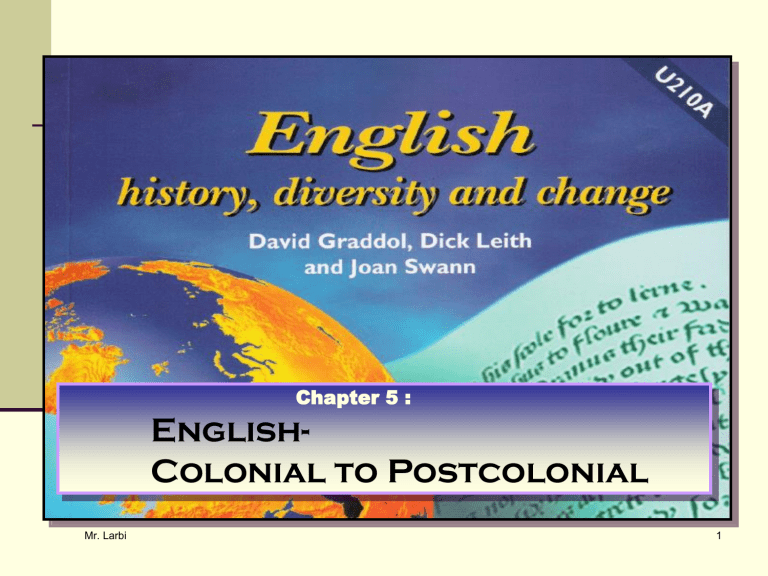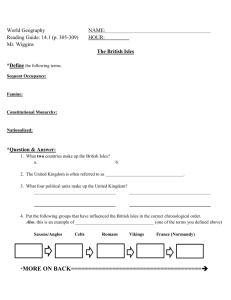4- Chapter 5 - Dr.Antar Abdellah Home Page

Mr. Larbi
Chapter 5 :
English-
Colonial to Postcolonial
1
English -
Colonial to Postcolonial
Introduction
This chapter focuses on
:
1 - The British Colonial Process
[12 th to 20 th centuries]
A -Within the British Isles .
B Beyond the British Isles .
C -The consequences of the British Colonial Process .
2 -
How did English spread within the British Isles ?
A -In Ireland
B -In Scotland
3 -
How did English spread beyond the British Isles ?
A -In North America
B In Australia
C -In Western Africa
4The Development of the English Pidgins & Creoles.
British
Colonial
Process
5Reading Assignments.
Mr. Larbi
Political
Incorporation
Nationalist
Reaction appearance of new English varieties
2
English -
Colonial to Postcolonial
1
The British Colonial Process Within the British Isles.
The British Isles
: The Celtic territories: Ireland , Scotland & Wales
The British Isles were colonized by English during the Middle Ages. [ 12 th century ]
The Celtic Languages continued to be widely spoken after the Germanic invasion of England in 5 th century.
After the Normans had conquered England in 1066, they colonized Wales and then Ireland by awarding land to knights in return for suppressing the Irish population.
The Celtic territories were the first countries to be politically incorporated in the English state: Wales in 1536 Scotland in 1707 Ireland in 1800
From 1800 England has revived the term Great Britain or United Kingdom.
English dialects and other languages were introduced into these Celtic territories.
3 Mr. Larbi
2
How did English spread in the British Isles?
Colonization Process
Political Incorporation
Under Elizabeth I (1558-1603) England invaded Ireland and defeated the Irish fighters. English confiscated Ireland and awarded it to fresh colonizers accordingly
After defeating the Irish fighters , English confiscated Ireland and awarded it to fresh colonizers: 1 Scots in the north-east of Ireland
2-The poorest population in London
It was after an uprising in 1798 that Ireland was incorporated into the United
Kingdom by the Act of
Union of 1800.
Nationalist Reaction
In Ireland
In 18 th century the Catholic church and the independence movement launched their claims for freedom .They chose English to be the language of their claims for independence on behalf of the Irish population:
In 1921 Southern Ireland got its freedom from the British state and becomes Republic
Irish that included 26 counties.
Northern Ireland is still part of the UK
Mr. Larbi
Celtic Language Effect on English
The distinctive form of English spoken in Ireland is known as Hiberno-English or [Irish-English]
It was influenced by the Celtic language that was the first language of many of its original speakers
The influence of the Celtic language on Hiberno-
English can be seen in pronunciation and grammar:
In Hiberno-English, there is no difference between
/t/ and /th/.
Clefting: sentences start with it’s :
It's looking for more land a lot of them are
4
Colonization Process
In 10th century different ethnic groups lived in Scotland: 1-Welsh, 2-Scottish Gaelic 3-Norse
4-Anglo-Saxon of Northumbria
The dominant one was the Scottish Gaelic, but the Anglo-Norman culture that was based on town building was adopted by the Scottish.
New towns were set and populated by
English speaking merchants:
Scottish called these towns [Inglis ]
In 15 th century Inglis was the official language of the Scottish state based in Edinburgh.
Political Incorporation
The process of political incorporation began when Elizabeth I of England died childless in 1603.
James 6 of Scotland was invited to become King James I of England
James resided in England rather than in Scotland and the two territories were united as the state of Great
Britain in 1707
In Scotland
Scots Effect on English
Nationalist Reaction
The Scottish [Gaelic, and Inglis ]reacted against the English colony and claimed their national identity Their motto was
To be Scottish is to be not English”
Scottish nationalism has emerged as a political force, and throughout Scotland today there
Is still huge disappointment the 1707 Union.
Mr. Larbi
Scottish language[ Sctos] is considered the language of lower class.
In 1983 the Bible was translated from English into
Scots vernacular and this has become a key factor of focusing.
The vernacular Scots lacks a standardized spelling system
There was no recorded effect of the vernacular Scots on English as it is vernacular and totally different from
English.
5
English -
Colonial to Postcolonial
2
The British Colonial Process beyond the British Isles.
At the end of 16 th century, Britain extended its colonies beyond the British Isles :
1-America 2-Australia 3-West Africa
One main motive for extending the colonies beyond the British Isles was economic:
Capitalist entrepreneurs were granted a monopoly over products by the British monarch. In return, the monarch got gain by taxing the profit made in trading them..
Another main reason was that colonies were useful for solving the economic and social problems in Britain during the 16 th century: unemployment and inflation combined with population growth to create a large class of poor people .
Overseas colonies beyond the British Isles were needed to provide labor for
Unemployed British people .
The third reason: The British colonization was motivated by competition among
European states: Portugal , Spain in 17 century, France in the 18 century and
Germany by the end of the 19 century
Between 16 and 20 century , the number of mother-tongue English speakers in the world increased from 7 to about 250 million. All of them lived outside the British Isles.
Mr. Larbi 6
3
How did English spread BEYOND in the British Isles?
In North America
Colonial Process
The first English colony in
North America was in
Jamestown, Virginia in 1607.
Like many of the early English
Settlers ,Puritans sought religious freedom from persecution by
Pennsylvania by migrating to
America.
Quaker colony [English &Welsh] settled in Pennsylvania
European colonists [French and
Dutch] settled also in the north
In the southern areas , the English lower class people settled there with the African Slaves who worked in cotton plantation.
Mr. Larbi
The spread of English In North America
The variety in terms of the ethnic groups that settled in America resulted in large changes in English of the American colonies : the phenomenon which affected English of the American colonies is that of dialect levelling as the settlers there speak many closely related language varieties
British English acted as a focusing agent in America and .
Therefore, the American speech tended to level out in the direction of the educated usage of London and south-east
England.
The widespread pronunciation of /r/: car, far, water ….
Elizabethan English in England was the source of this widespread pronunciation of/r/.
Noah Webster in 1783 called for uniformity for the American
English and the necessary differences between American and
British English.
7
Mr. Larbi
The British Colonies in North America
8
In Australia
Colonial Process
The first colonization of Australia by the British occurred after its discovery in 1788
Australia was first used as an exile for the British convicts.
Many of the convicts, once freed, gradually coined vocabulary to name new colonial identities and distinguish themselves from the precolonial Aboriginal population .
Mr. Larbi
The spread of English In Australia
Australian pronunciation is very close to Cockney, except that initial /h/ is sounded
/h/ was introduced as a result of substantial settlement from
Ireland .
Another feature of the English pronunciation in the British colonies in Australia is lengthened pronunciation vowels were pronounced with the front of the tongue
[Lengthened pronunciation is till used in the south-west of
England
Due to the diversity of non- British-born 'free settlers' from
Europe and south-east Asia, different English varieties in
Australia underwent levelling.
Because Australian pronunciation has been stigmatized
Received Pronunciation (RP) has been perceived as a norm in the Australian education system.
9
In West Africa
Colonial Process
In 19 th century the entire African continent was seized and shared out among the European states:
France, Spain and Britain.
In West Africa, there weren’t people from the British Isles.
Instead, the new colonies were administered by a small number of British officials
Britain dealt with African colonies just as source of producing raw materials.
The African colonies were looked at as underprivileged because of their color and lower-stage culture.
Mr. Larbi
The spread of English In West Africa
As the British colonies in Africa were incorporated in the the British empire, a movement called pan-Negroism emerged as an act of solidarity with the racism against Black Americans
.
Later pan-Africanism, movement emerged as an anti-colonial struggle for blacks in Africa alone.
English was the language of pan-Africanism movement.
The movement for African independence and the English language have been linked.
English was considered as the best suited to unify Africans as it is a composite language, not the product of anyone people
[
Edward Blyden
.]
The huge numbers of different language varieties spoken in
Africa were considered as a problem for the cause of independence Tribalism was replaced by nationalism through learning English.
10
Mr. Larbi
The British Colonies in West Africa
11
English -
Colonial to Postcolonial
4-
The Consequences of the British Colonial Process within and beyond the British Isles
Political Incorporation
Ireland, Scotland and Wales have become part of United Kingdom . The British Colonies beyond the British Isles are referred to as the commonwealth: Australia, New Zealand…
The Consequences of the British Colonial
Process
Nationalist Reaction
The colonies reacted against the British colonization and fought indirectly for the preservation of their own social and cultural identity. Different forms of nationalist reaction characterized the political life in many of the British colonies
New English varieties were developed dialect levelling: When speaker of different varieties of English are brought together in a colony, dialect level is needed : differences between speakers tend overtime to lessen.
Substrate : When the phonological and grammatical systems of English are adopted.
Hiberno-English: Irish-English
Pidgins & Creoles : informal English for trade purposes. It includes simple vocab. & limited gram.
Mr. Larbi 12
English -
Colonial to Postcolonial
5
The Development of the English Pidgins & Creoles
1- Pidgins
It’s a makeshift language that was developed as a result of slave trade.
simplified language used between
African middle -men who sell slaves
[ in return of good things] and the
Portuguese. The Portuguese ship the African slaves to the Caribbean
Islands.
Pidgins is a very simple language for simple kinds of interaction, and its vocabulary and grammar are very limited.
2- Creoles
Once it had been passed on to the children of the slaves, and used by them as a first language, it became a Creole
The slaves at first were outnumbered by the
British population, with whom they worked and lived closely; children of mixed parentage were born, and these formed a new class of free tradesmen with very basic education
Creolization happened in many parts of the
English-speaking Caribbean & Jamaica
There are some common features between
Hiberno-English and Creoles:
/th/ is pronounced as /t/
The forms of verbs:
He do give me
13 Mr. Larbi
READING ASSIGNMENT for DESCUSSION
Chapter 5
Reading A
Reading B
Reading C
Pages
.213- 221
Mr. Larbi 14





